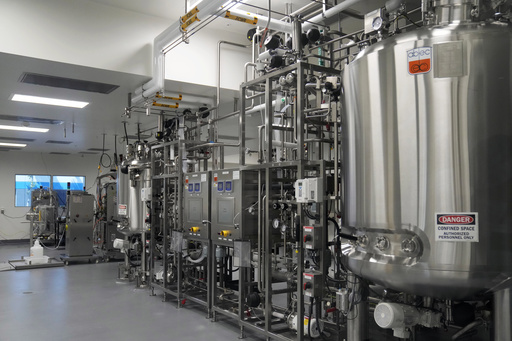LINCOLN, Neb. — The initiative to prohibit the sale of lab-grown meat may appear obvious in a state like Nebraska, known for its beef production, but a notable portion of opposition has emerged from ranchers and agricultural organizations. They assert that they can thrive in a competitive market without requiring government intervention.
Nebraska’s Governor Jim Pillen, one of the largest pork producers nationwide, is advocating for the ban on cultivated meat, aiming to safeguard the interests of ranchers and meat manufacturers. Last August, the Republican governor signed an executive order preventing state agencies and contractors from acquiring lab-grown meat products, despite the fact that consumer availability may still be years away.
Numerous ranchers and representatives from the meat industry are contesting the governor’s proposal. Dan Morgan, a fourth-generation cattle rancher from central Nebraska, has expressed openness to lab-grown meat producers competing with his premium waygu beef, stating that hindering competition is contrary to the principles of a free market, particularly in a predominantly Republican state like Nebraska.
Morgan criticized the ban as a contradiction of conservative values, arguing that the government should simply oversee the product’s labeling and facility inspections, ensuring food safety, while leaving the purchasing decisions to consumers.
Nebraska ranks among about a dozen states that have initiated legislation to restrict or ban the production, sale, or distribution of lab-grown meat, as shown by a recent analysis using bill-tracking software. So far, two states, Florida and Alabama, have enacted such bans.
The focus of these legislative efforts is on “cell-cultivated” or “cell-cultured” meat, which is produced from animal cells grown in bioreactor tanks, surrounded by nutrients that enable them to develop into muscle, fat, and connective tissue.
The move to ban cultivated meat appears premature, especially since it may still be years before it becomes an established market. Although more than two dozen companies are working on developing these products, only two companies—Upside Foods and Good Meat—have received federal approval to sell cultivated chicken in the U.S. Additionally, neither is close to mass production or retail distribution.
Recently, advocates for the Nebraska bill have changed their focus from protecting the industry to raising safety concerns about cell-cultivated meat. This includes state Sen. Barry DeKay, a rancher backing the bill, and Sherry Vinton, the head of the Nebraska Department of Agriculture. Both expressed worries over potential health risks associated with consuming this type of meat during a recent committee hearing.
Yet it’s clear that protecting Nebraska’s traditional meat industry is at the heart of the ban. The state leads the nation in beef production and exports, as reported by the Nebraska Department of Agriculture. During his recent State of the State address, Governor Pillen highlighted the ban as one of his foremost priorities.
Pillen criticized supporters of lab-grown meat, equating them to activists who threaten to undermine traditional farming. He stated, “The backers of these products are cut from the same cloth as the anti-farmer activists who want to put our agriculture producers out of business, and we need to recognize them as such.”
The Association for Meat, Poultry and Seafood Innovation—a trade organization representing the burgeoning cultured meat sector—rejects the governor’s characterization of lab-grown meat as a threat. They point to research indicating that global demand for meat-based protein is expected to double by 2050. “We’re really a complementary component here,” commented Suzi Gerber, the association’s executive director.
Several farming organizations, such as the Nebraska Farm Bureau and Nebraska Cattlemen, assert they aren’t concerned about competition from the cultured meat industry. Instead, they endorse a proposal that mandates clear labeling for lab-grown products to differentiate them from conventional meat. Over a dozen states have introduced similar labeling initiatives, with some states, including Colorado, shifting their focus from bans to labeling requirements.
Paul Sherman, an attorney with the Institute for Justice who represents Upside Foods in its legal battle against Florida’s ban, suggested the push for bans is spearheaded by those affiliated with traditional agricultural sectors. He noted, “It’s evident that these laws aren’t about protecting public health and safety. They’re aimed at shielding traditional agriculture from market competition, which is not a legitimate use of government authority.”




